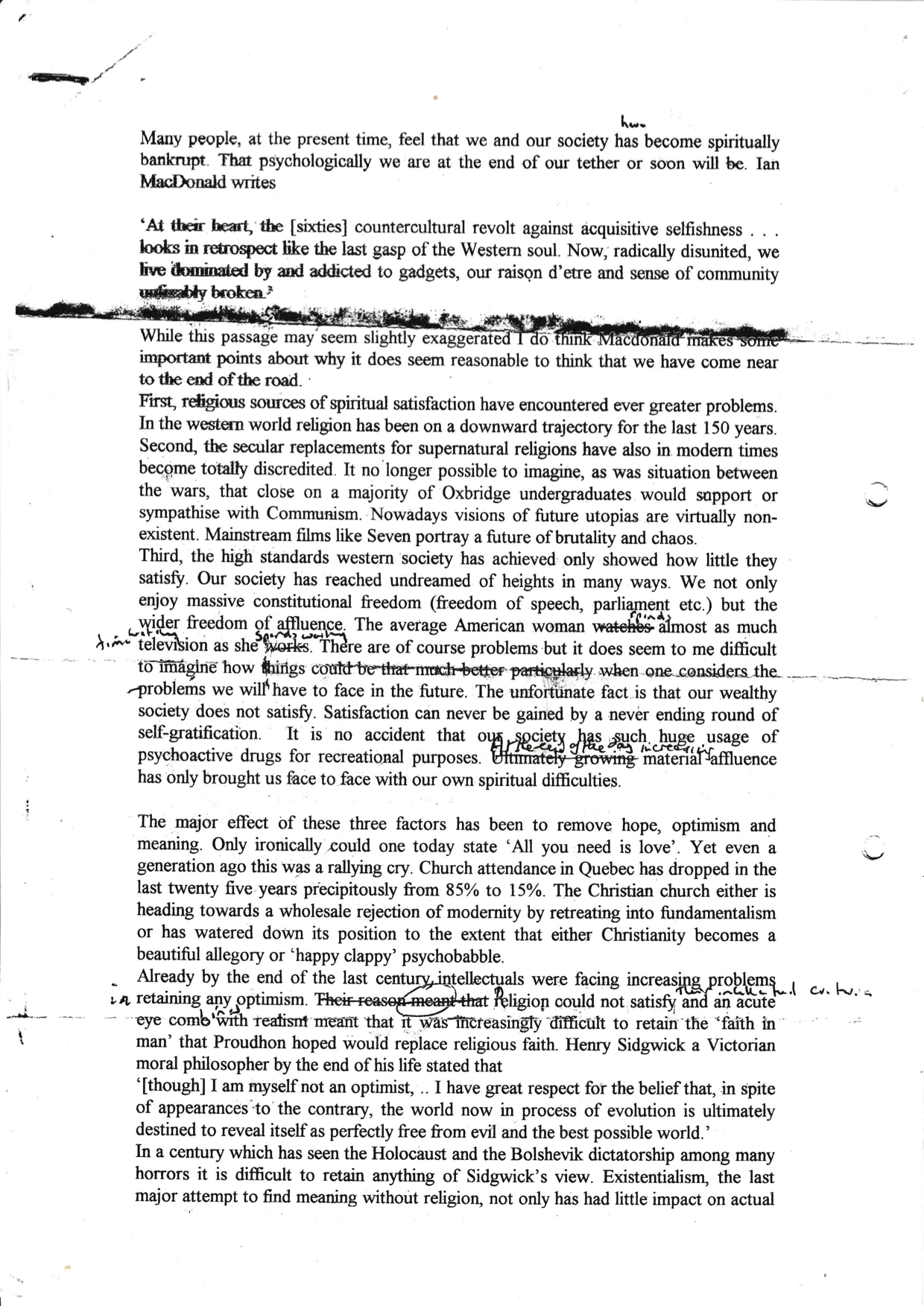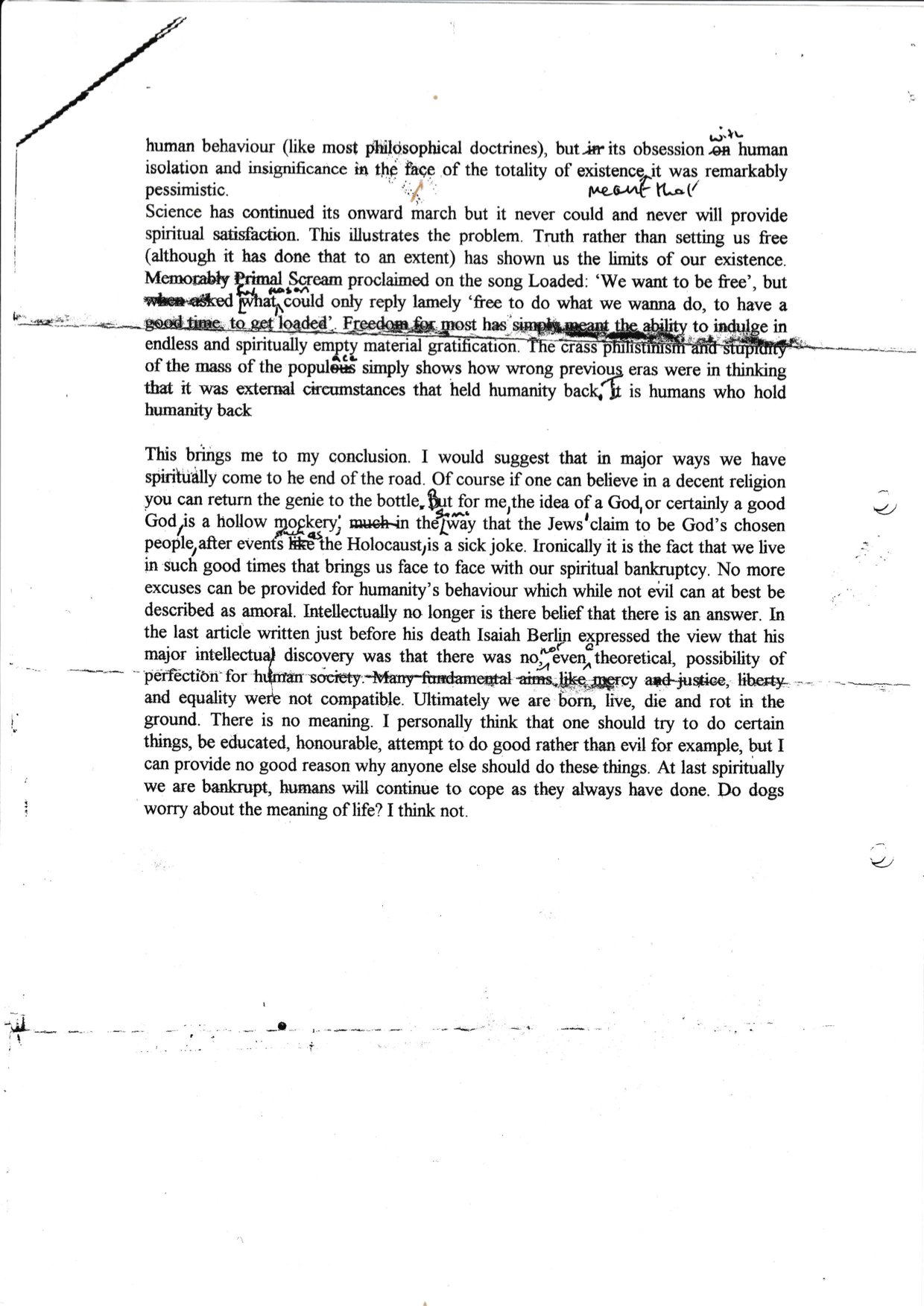Our Spiritual Bankruptcy
This essay was written when I was sixteen or seventeen (in my last year or two of school). A teacher said that I could give a talk to the whole school at our morning assembly (once a week a teacher gave a short talk during assembly and she assigned me her session). This was the talk I gave. It accurately reflects the depressive existential nihilism I felt trapped in at the time. (With hindsight and greater knowledge, I can see it is illustrative of a larger “hole” that modernity has got itself stuck in and which our culture is still grappling with. It is also clear that there are paths out– paths that my younger self was unable to see).
Many people, at the present time, feel that we and our society have become spiritually bankrupt. That psychologically we are at the end of our tether – or soon will be. Ian MacDonald writes
At their heart, the [sixties] countercultural revolt against acquisitive selfishness looks in retrospect like the last gasp of the Western soul. Now, radically disunited, we live dominated by and addicted to gadgets, our raison d’etre and sense of community unfixably broken
This passage may seem slightly exaggerated. Nevertheless, Macdonald makes important points about why we have come near the end of the road.
First, religious sources of spiritual satisfaction have encountered ever greater problems. In the western world religion has been on a downward trajectory for the last 150 years. Second, the secular replacements for supernatural religions have also in modern times become totally discredited. It no longer possible to imagine, as was situation between the wars, that close on a majority of Oxbridge undergraduates would sapport or sympathise with Communism. Nowadays visions of future utopias are virtually non-existent. Mainstream films like Seven portray a future of brutality and chaos.
Third, the high standards western society has achieved only showed how little they satisfy. Our society has reached undreamed of heights in many ways. We not only enjoy massive constitutional freedom (freedom of speech, parliament etc.) but the wider freedom of affluence. The average American woman spends almost as much time watching television as she spends working. There are, of course, problems but it does seem to me difficult to imagine how things could be that match better particularly when one considers the problems we will have to face in the future. The unfortunate fact is that our wealthy society does not satisfy. Satisfaction can never be gained by a never ending round of self-gratification. It is no accident that our society has such high usage of psychoactive drugs for recreational purposes. Ultimately growing material affluence has only brought us face to face with our own spiritual difficulties.
The major effect of these three factors has been to remove hope, optimism and meaning. Only ironically could one state today that “All you need is love”. Yet even a generation ago this was a rallying cry. Church attendance in Quebec has dropped in the last twenty five years precipitously from 85% to 15%. The Christian church either is heading towards a wholesale rejection of modernity by retreating into fundamentalism or has watered down its position to the extent that either Christianity becomes a beautiful allegory or ‘happy clappy’ psychobabble.
Already by the end of the last century, intellectuals were facing increasing problem in retaining any optimism. Religion could not satisfy their intellectual criteria and an acute eye come with realism meant that it was increasingly difficult to retain the ‘faith in man’ that Proudhon hoped would replace religious faith. Henry Sidgwick a Victorian moral philosopher by the end of his life stated that:
[though] I am myself not an optimist, .. I have great respect for the belief that, in spite of appearances to the contrary, the world now in process of evolution is ultimately destined to reveal itself as perfectly free from evil and the best possible world.
In a century which has seen the Holocaust and the Bolshevik dictatorship among many horrors it is difficult to retain anything of Sidgwick’s view. Existentialism, the last major attempt to find meaning without religion, not only has had little impact on actual with human behaviour (like most philosophical doctrines), but it was remarkably pessimistic in its obsession with human isolation and insignificance in the face of the totality of existence.
Science has continued its onward march but it never could and never will provide spiritual satisfaction. This illustrates the problem. Truth rather than setting us free (although it has done that to an extent) has shown us the limits of our existence. Memorably Primal Scream proclaimed on the song Loaded: “We want to be free”, but when asked for what reason, could only reply lamely “free to do what we wanna do, to have a good time to get loaded”. Freedom for most has meant the to indulge in endless and spiritually empty material gratification. The crass philistinism and stupidity of the mass of the populous simply shows how wrong previous eras were in thinking that it was external circumstances that held humanity back. It is humans who hold humanity back.
This brings me to my conclusion. I would suggest that in major ways we have spiritually come to he end of the road. Of course if one can believe in a decent religion you can return the genie to the bottle. But for me, the idea of a God, or certainly a good God is a hollow mockery; in the same way that the Jews’claim to be God’s chosen people has become a sick joke after events such as the Holocaust. Ironically it is the fact that we live in such good times that brings us face to face with our spiritual bankruptcy. No more excuses can be provided for humanity’s behaviour which can at best be described as amoral.
Intellectually no longer is there belief that there is an answer. In the last article written just before his death Isaiah Berlin expressed the view that his major intellectual discovery was that there was no, not even theoretical, possibility of perfection for human society. Many-fundamental aims, like mercy and justice, liberty and equality were not compatible. Ultimately we are born, live, die and rot in the ground. There is no meaning. I personally think that one should try to do certain things, be educated, honourable, attempt to do good rather than evil for example, but I can provide no good reason why anyone else should do these things. At last then, spiritually we are bankrupt, humans will continue to cope as they always have done. Do dogs worry about the meaning of life? I think not.

